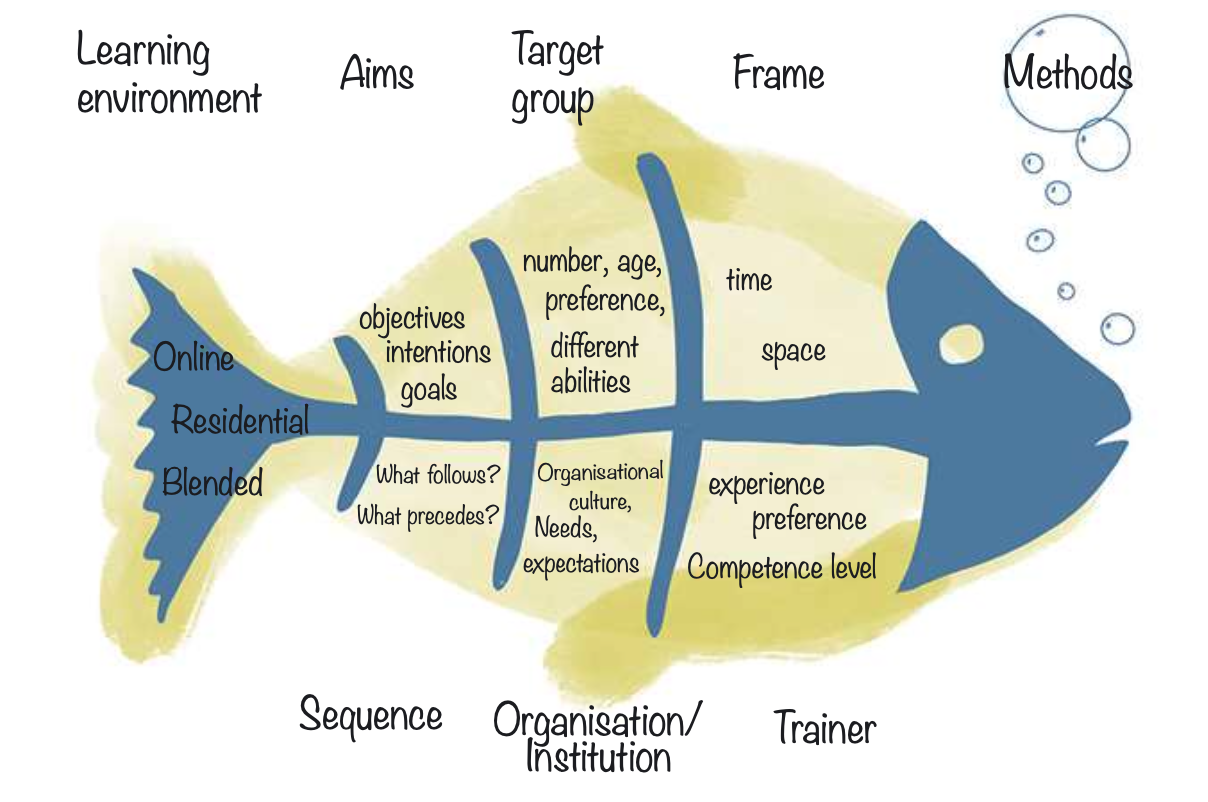1
Designing workshops and selecting methods
Designing workshops and selecting methods
Teave
In the following introductory video, you can explore some primary and hopefully practical considerations when designing workshops and activities.
Disclaimer: Be mindful that this video was created having in mind trainers and facilitating learning in the training context. However, many principles will apply to designing learning activities in a youth work context.
There are three aspects the video focuses on:
- How to choose methods for a learning activity.
- What does it mean to create and hold space for participants?
- How to develop further as a trainer (or facilitator in the youth work context).
Below, we share some of the considerations that facilitators must consider when planning learning activities and choosing methods.
- PARTICIPANTS - What are the profile, needs, abilities and interests of your participants?
- FACILITATORS - What are your expertise and preferences as facilitators?
- MOTIVATION - What is your motivation for doing the workshop?
- CONTEXT - What is the environment where your workshop will be happening?
- SETTING - What space, time, resources, and equipment will be needed/available?
- SEQUENCE - What activities do come before and after the workshop?
- METHODS What will you choose?
- OUTCOMES - What do you want your participants to achieve during the workshop?
The above is adapted from the T-kit Training Essential, which provides a comprehensive overview of how to design learning activities and choose methods. See the fish model below and download the complete explanation of how to apply it to practice.

Now that you are familiar with activity design principles and how to choose methods, complete the training script for a session or a workshop to be implemented in the (international) workshop activity in the youth work field. Download the training script template to use.
Go to the badge and submit evidence to showcase your learning and understanding of how to facilitate group dynamics.
The Awero organisation first created this educational resource and activity for the youth workers' training on Facilitating Learning course.
This activity supports youth workers' competence development in the "Facilitating learning" area. Activity content and badge issuing criteria aligned with the European Training Strategy (ETS) competence model for youth workers to work internationally:
- Readiness to upskill and stay up-to-date with existing methods and related sources and tools.
- Openness to using different ways and methods to encourage creativity, problem-solving and ‘out-of-the-box’ thinking
- Knowledge on how to look for information about methods and methodology and how to share the resources adequately
- Knowledge of the principles of methodologies used in the field of youth
- Skill of choosing appropriate methods and assessing young people’s learning needs and objectives
- Aims at reaching educational aims by using specific ways and methods that encourage creativity, problem solving, ‘out-of-the-box’ thinking, in different environmental aspects
Want to endorse (?) our organisation, this activity and/or badge - email us! Contact us at info@awero.org for further questions.
Get activity badge
Workshop Designer Get this badge
The badge earner learned workshop design principles and ways for choosing methods for learning activities implemented in the (international) youth work context and non-formal education field.
To get this badge, youth worker:
- Watched an introductory video (optional) and familiarised with considerations when choosing methods.
- While working in an international team, developed a workshop script for a workshop to be implemented in the youth work and non-formal education context.
Activity content and badge issuing criteria aligned with the European Training Strategy (ETS) competence model for youth workers to work internationally.
Learning duration: 6 hours
Ülesanded
Task no.1
Evidence verified by: one activity organiser
To get this badge:
- Get familiar with video and text resources on designing activities and choosing methods in the youth work training setting.
- Use the workshop script template (or your one) to plan the training and learning session or workshop. Upload it for the badge evidence.
Skills
#Readiness to upskill and stay up-to-date with existing methods and related sources and tools
#Openness to using different ways and methods to encourage creativity, problem solving and ‘out-of-the-box’ thinking
#Knowledge on how to look for information about methods and methodology and how to share the resources adequately
#Knowledge of the principles of methodologies used in the field of youth
#Skill of choosing appropriate methods and assessing young people’s learning needs and objectives
#Aiming at reaching educational aims by using specific ways and methods that encourage creativity, problem solving, ‘out-of-the-box’ thinking, in different environmental aspects
Organiseerijad
Awero
Badge issuer recognized with
Vaheta keelt:

